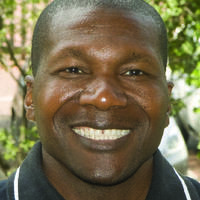
Azwinndini Muronga is now a dean of science at Nelson Mandela University. He spoke to Minnesota Alumni in 2014.
When Azwinndini Muronga (Ph.D. '02) was hired as associate professor in theoretical physics at the University of Johannesburg in October 2010, he was happy to find a new home for his internationally acclaimed scholarship. That he could also empower new generations of scientists in his homeland made him even happier.
In January 2011, he helped launch the Soweto Science Centre to address literacy and math deficiencies among South African youth. Educated in poor villages that lack resources and well-trained teachers, students often take five years to complete a degree that should take three. "We need to rescue them so they can come to the university," says Muronga.
Ironically, the apartheid system that created educational disparity between blacks and whites yielded an opportunity to remedy it. In 2005, when white and black universities merged to form the University of Johannesburg, the new science department was housed on the formerly white campus, leaving vacant a science building just over the hill, on the formerly black Soweto campus. That building is now the Soweto Science Centre. On Friday afternoons, all day Saturday, and throughout quarterly multi-week school breaks, it houses 821 students ages 15 to 17 who study chemistry, physics, life sciences, and related subjects. Some had never seen a computer before. Hailing from 110 schools, some an hour away, they attend for three years and complete grades 10 through 12. Thirty-five tutors teach them. Muronga's vision for the center stems from his roots in tiny Tshiozwi, in Limpopo Province. "In the village where I grew up, there were no role models," he says. "That was my driving force."
The secondary school he attended lacked labs yet distinguished itself by producing graduates who excelled in science. Muronga attributes its success to the principal's passion for education and ability to motivate parents, students, and teachers.
"We soldiered on, even with no resources," Muronga says. "If you came to our classroom and heard noise, it wasn't about movies or weekend plans. We were fighting over math problems and who was doing them right."
Among Muronga's challenges as the center's director is promoting its mission to Soweto's parents and schools, which he visits often. The center is funded by private donations, but parents pay 600 rand annually (about $60). "We want it to be as [accessible] as possible, but we need a commitment fee," he says.
Earlier in 2013 Muronga received the University of Minnesota's Distinguished Leadership Award for Internationals. "It is such an honor to be recognized by one of the top research universities in the U.S.A.," he says. "This award will uplift the dreams of an African child."
Muronga dreams of a huge new Soweto Science Centre building to house a program encompassing all ages, even as he pursues a demanding teaching and research career.
"To me, those things are not separate," he says.
 Global
Global